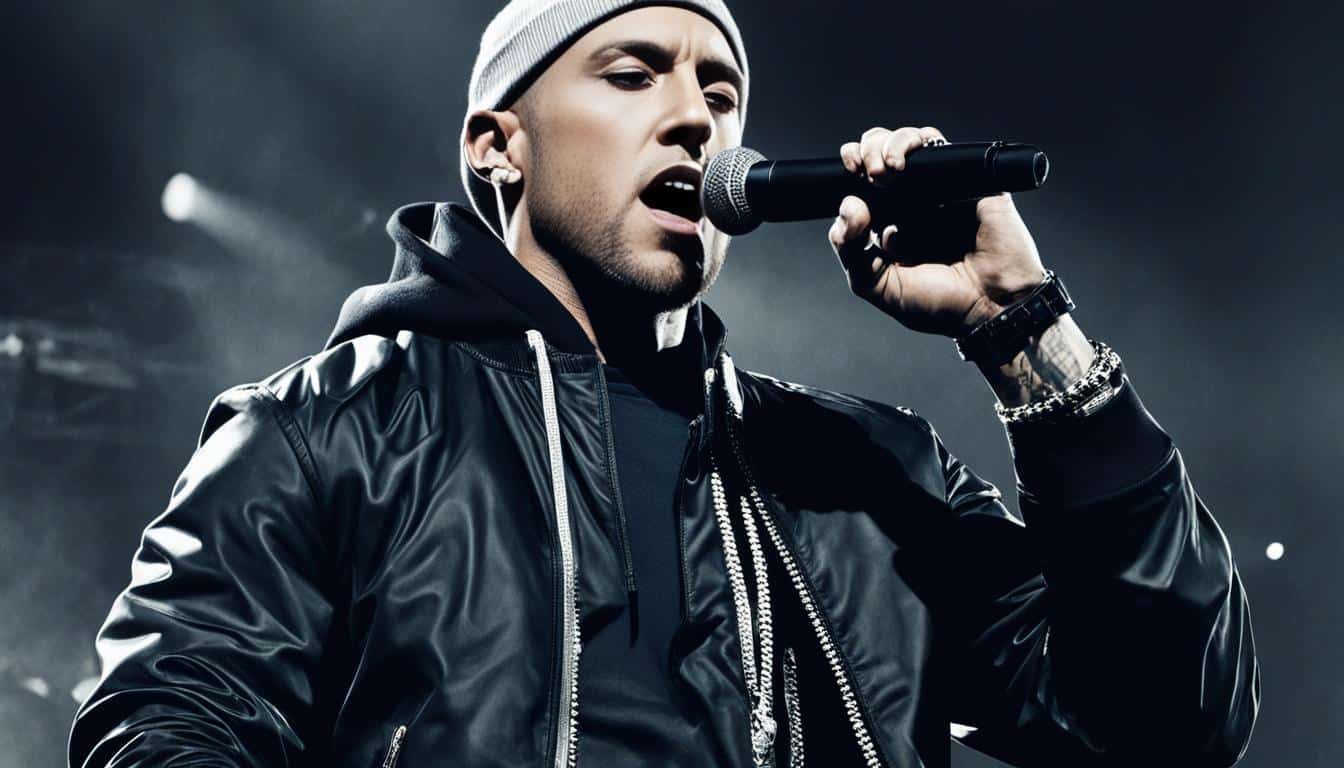Why Do People Hate Eminem?

It might seem puzzling when you consider the immense success and groundbreaking tracks that have come from this iconic artist. Yet, the truth is, Eminem has become a magnet for controversy, attracting a fair share of vitriol as much as he does praise. Could it be his provocative lyrics, or is it the abrasive alter-ego Slim Shady that fans love to loathe? Your curiosity isn’t unfounded—there’s a legion of Eminem haters out there, and they’re not shy about their reasons for hating Eminem. From slamming household names to family members in his rhymes, to an in-your-face presentation that’s often branded as an ‘extremely annoying voice,’ the public opinion on Eminem is as polarized as his lyrics.
Back in 1997, when the Detroit rapper burst onto the scene, cries of him being a sell-out began to echo in some corners. Fast forward to today; opinions have amassed, with some stating they’d prefer to jam out to Vanilla Ice than sit through an Eminem record. Whether it’s about his alleged hypocrisy, accusations of unoriginality, or his interactions with fellow celebrities, the backlash against Eminem has spanned decades, leaving us to question the relationship between Eminem’s provocations and how we, as listeners, engage with his controversial artform.
Exploring the Public Critique Against Eminem
When you dive into the myriad of criticisms of Eminem, you’ll find a complex landscape punctuated by vocal detractors. From his nasally rap delivery to the bold claims made in his lyrics, opinions sharply divide. Some music enthusiasts argue his voice grates on the nerves, a far cry from the smooth flows typical of hip-hop legends. This distinctive style, while iconic to some, fuels negative opinions about Eminem for others.
Accusations of hypocrisy often surface in discussions around the artist’s interactions with fans. His perceived reluctance to provide autographs has been interpreted as a fair-weather approach to fan engagement, leading to further backlash. Coupled with comparisons to artists like Vanilla Ice, these sentiments depict Eminem as a sell-out to his critics, lacking authentic street credentials.
Significantly, the hip-hop community has had its share of Eminem dissenters who label his work as unoriginal, asserting that the shock value of his songs wears off rapidly. The charge is that once the novelty of Eminem’s controversial lyrics fades, so too does the artistic merit of his music. His sprawling influence inevitably ties him to other divisive figures in the industry, fed by the fever of Eminem controversies, painting an intricate portrait of the rapper that is less than flattering. Whether seen as an arrogant fixture in the music world or as a musician failing to evolve with the times, Eminem’s ability to ignite strong emotions remains undiminished.
The Controversial Alter Ego: Slim Shady
As you delve into Eminem’s world, it’s impossible to ignore his infamous alter ego, Slim Shady—a persona that has incited countless Eminem controversies and shaped public opinion on Eminem. This character, notorious for its extreme rhetoric and boundary-pushing lyrics, has left fans and critics divided. Whether it’s through pure shock value or a complex satire of society, this enigmatic figure lurks at the heart of Eminem’s legacy.
Origins and Impact of Slim Shady
Slim Shady represents the darker, more villainous side of Eminem. Conceived as a way to voice unfiltered thoughts without personal backlash, Shady quickly became a symbol of rap’s provocative edge. With his birth in the late 90s, fans were introduced to a voice that was unafraid to disturb the status quo that existed within—and outside—the hip-hop genre.
Public Perception and Distaste for Eminem’s Persona
The lines between artist and alter ego can often blur, bringing fan criticism of Eminem to new heights. Condemnations flood in for lyrics that strike as misogynistic, violently explicit, or even homophobic, and there seems to be a constant tension in reconciling the artist’s intentions with the persona’s impact. The raw delivery of such content not only generates discussion but also stirs a public opinion on Eminem that varies from artistic genius to provocateur without cause.

The dichotomy of Slim Shady doesn’t stop at his creation; it extends to his influence on both the industry and audiences. Some see Shady as a mirror to society’s underbelly, while others simply see an excuse for a display of venomous language and ideas. Regardless, this alter ego stands as a testament to the challenging, often uncomfortable place Eminem holds in music history—an artist as famous for his verses as he is for the uproar they elicit.
Taboo Topics and Societal Boundaries in Eminem’s Music
When you delve into Eminem’s discography, you’re confronted with Eminem’s provocative lyricism that tackles themes and narratives far from the sanitized mainstream. His willingness to explore Eminem’s subject matters that others might shy away from has cemented his status as a rap icon. But it’s not just his technical skill that has drawn attention; it is the unflinching manner in which he confronts Eminem’s raw lyricism that has both shocked and captivated audiences worldwide.
Tracks like “Kim” and “Stan” emerge not just as songs but as stories that punch through societal norms, forcing listeners to engage with uncomfortable truths. Eminem uses his music as a canvas to paint gritty, sometimes horrifying pictures of reality, inviting—or perhaps daring—listeners to reflect on the darker aspects of human nature and society. While doing so, he walks a fine line, frequently crossing into territory that sparks debates about moral boundaries in art and entertainment.
Critics have been quick to label some of his lyrics as misogynistic or homophobic, suggesting that such content could incite harmful behavior. Yet, Eminem often defends his work as an artistic depiction of life’s brutalities, not a glorification of them. The tension between creative freedom and societal values remains a recurring motif in the discourse surrounding his music.
These forays into taboo subjects by Eminem have consistently ignited conversation and controversy. However, they have also prompted a broader discourse on the limits of expression within the musical arena and the responsibility of artists in reflecting the societal mores they inhabit.
Mainstream Dominance and Cultural Appropriation Accusations
You can’t ignore Eminem’s sweeping impact on hip-hop, a genre that has fiercely guarded its roots and cultural significance. With his substantial mainstream popularity, Eminem has not only climbed the charts but also spurred debates about authenticity in the hip-hop world. As Eminem’s music resonates with a wider audience, some within the community view his rise with a critical eye.
Why Eminem’s Popularity Ignites Backlash
The intensity of Eminem’s fame has been a double-edged sword. His albums fly off the shelves, yes, and his lyrics fill the airwaves; yet, his ubiquity has ignited a spark of backlash. Eminem’s identification with black culture, coming from a white artist, has ruffled feathers within hip-hop circles that hold the genre as a voice for marginalized communities—an insider’s expression of life on the fringes.
The Debate Over a White Rapper in Hip-Hop
With his lightning-fast raps and gritty tales, Eminem has carved a space for himself in a predominantly black industry. But whispers of cultural appropriation in hip-hop shadow his every move, stirring discussions on whether his immersion and success within the genre represent a celebration of diversity or a breach of cultural boundaries. Eminem’s situation adds complexity to dialogues about race, power, and the respectful appreciation versus appropriation of black culture in America.
Infamous Eminem Moments That Fueled the Fire
As you delve into Eminem’s storied career, it’s impossible to ignore certain flashpoints that have turned up the heat among Eminem haters. Incidents laced with Eminem’s homophobic lyrics have sparked significant backlash against Eminem, propelling his controversies into the limelight and drawing severe criticism. Think back to the 2001 Grammy Awards—his duet with Elton John was both a statement and a source of outrage due to the provocative lyrical content that preceded it. This moment encapsulated the complex relationship between the artist’s work and the public’s tolerance for offensive language within the context of art and entertainment.
Moving on, the 2003 MTV Video Music Awards showcased a facetious Eminem battling Triumph, the Insult Comic Dog. This performance displayed his controversial humor and penchant for stoking the fires of infamy, further polarizing audiences. Fast forward to the release of “Relapse,” and Eminem found himself under scrutiny yet again. This album faced backlash for its depictions of violence, particularly against women, showcasing a darker side of his lyricism that was becoming increasingly problematic for social sensibilities.
Beyond the music, Eminem’s political rants added a fresh layer of dissent, especially his 2017 BET Awards freestyle targeting President Donald Trump. This segment resonated with some yet alienated conservative audiences, amplifying the political dichotomy in Eminem’s fanbase. It’s also worth noting Eminem’s fairly recent comments concerning Gen Z, which spotlight his resistance to changing cultural currents and underscore his status as a provocateur seemingly at odds with progressive social narratives.
These moments, among others, have set Eminem apart as a perpetual lightning rod for criticism—garnering both acclaim for his fearless self-expression and condemnation for his inflammatory and divisive content. Whether you regard these incidents as bold artistic statements or regrettable missteps, they are undeniably etched into the collective memory of Eminem’s roller-coaster journey through fame and infamy.
Eminem’s Impact on Generation Z and the Current Cultural Climate
As you look into the dynamic between Eminem and the youth of today, it’s important to recognize how Gen Z’s perspectives are reshaping the way we view musical icons. Eminem has had an undeniable impact on the rap industry; however, his traditional ways of stirring controversy now face the scrutiny of a generation that values social consciousness.
Connecting with a Younger Audience
Eminem’s cultural relevance is questioned as he attempts to connect with a cohort that is far removed from the era of his rise to fame. Despite his efforts to reach out to this audience, his tactics and content face criticism across social platforms where Gen Z thrives. This younger generation, often highlighted for their progressive values and inclusive culture, clashes with Eminem’s legacy of shock tactics and brazen lyrics.

The Gap Between Generational Values and Eminem’s Lyrics
Public opinion on Eminem among Gen Z reflects a generational gap in values. Lyrics that once brought fame now evoke a sense of discord with current societal norms. This has led to an intriguing discussion about the evolution of public sentiments and the continuous challenge of maintaining relevance by artists from previous eras. Eminem’s provocative style in the past has unfortunately positioned him at odds with the lens through which Gen Z evaluates the cultural influence of artists today.
Breaking Down the Reasons Behind the Negative Opinions About Eminem
It’s no secret that Eminem has been a polarizing figure in the music industry. Despite his substantial fan base, a significant number of people harbor negative opinions about Eminem. This aversion towards the Detroit rapper isn’t without a complex web of reasons, and understanding why some listeners might distance themselves from his work is an elucidating endeavor.
You may have noticed how Eminem’s rise to fame was meteoric, but not without controversy. Such a quick climb to the pinnacle of hip-hop stirred resentment among those who questioned the novelty of his music. Coupled with a raw, unapologetic vocal presence, Eminem’s path was littered with Eminem controversies that only widened the chasm between him and a portion of the hip-hop community.
Interestingly, fan criticism of Eminem often turns the spotlight on his alter ego, Slim Shady. This character became an outlet for lyrics that slice through societal norms, but not without consequence. Shady’s aggressive and acerbic wit has certainly left a bitter taste in the mouths of many, compounding why do people hate Eminem. Eminem’s image has been imprinted with a defiance to shift away from this contentious persona, which some argue hinders his adaptability to a more socially aware culture.
The Critical Reception Within the Hip-Hop Community
Within the close-knit circles of hip-hop aficionados, Eminem’s respect—or perceived lack thereof—for the genre’s cultural roots has been a catalyst for debate. His confrontational lyrics and actions have, in some cases, overshadowed the collective efforts to promote unity and mutual respect within the industry, and this has undoubtedly contributed to the critical reception.
The complexity of Eminem’s character and his enduring legacy means your understanding of the rap icon might be shaded with different hues of appreciation or disdain. Yet, it’s these discussions, critiques, and debates that keep the conversation about Eminem—as an artist and a cultural figure—alive and kicking in the hip-hop community and beyond.
Unraveling the Complexities Behind Eminem’s Controversial Reputation
Have you ever wondered why there’s such a potent blend of dislike and admiration for Eminem among listeners? With ample criticisms of Eminem, ranging from his confrontational lyrics to his jarring vocal style, it’s clear that his place in the music industry is marked by controversy. Some people express disdain for what they perceive as personal attacks in his songs and consider his voice grating, escalating the backlash against Eminem within certain circles. Despite his undeniable talent and contributions to hip-hop, these elements have chipped away at his popularity among some fans.
Eminem’s commercial triumphs have also sparked debate, leading some Eminem haters to decry him as a sell-out, diluting his artistic integrity for mainstream success. His omnipresence on channels like MTV has fed into this narrative, with detractors suggesting that his content has become stale and repetitive. Coupled with his aggressive public persona, Eminem has attracted significant criticism and fueled conversations about his influence and legacy. While some view these attributes as a betrayal of hip-hop’s ethos, others argue they are emblematic of his unapologetic approach to music and fame.
Furthermore, Eminem has become a polarizing figure through his associations with controversial industry peers and his forthright comments on sensitive political issues. This has intensified the divide, leading to a hardened stance from both fans and critics alike. Why do people hate Eminem? The reasons are as complex as his lyrics, weaving a tapestry of artistry, rebellion, and the inevitable backlash that often comes with pushing boundaries. Eminem’s career, shadowed by as many haters as there are admirers, continues to stimulate intense debates over his place in the hip-hop pantheon and the broader cultural sphere.
FAQ
What are some reasons for hating Eminem?
Eminem has faced criticism for various reasons, including accusations of slamming everyone including his own family, having an annoying voice, being a hypocrite, being a sell-out, lacking originality, providing dull concert experiences, refusing autographs, and displaying arrogance by referring to himself as “the best rapper on the planet.” These multifaceted criticisms contribute to the backlash he receives.
How has the public critiqued Eminem’s persona and music?
The public has expressed critiques of Eminem’s abrasive vocal style, hypocritical behavior, and seemingly worn-out song content. His controversial alter ego Slim Shady and his aggressive public demeanor also reinforce negative public opinion, with additional friction coming from his associations with divisive figures in the industry.
What impact has Eminem’s alter ego, Slim Shady, had on his career?
Slim Shady, Eminem’s controversial alter ego, allows Eminem to explore more extreme and offensive lyrics. While Eminem differentiates between Slim Shady and himself, many audiences see them as one, leading to distaste for both the character and the artist. The alter ego’s provocative nature, misogyny, homophobia, and graphic violence have sparked outrage among certain audience segments.
Why is Eminem’s music controversial in terms of societal boundaries?
Eminem often delves into taboo subjects that push the boundaries of mainstream music with explicit and violent narratives. Critics argue his lyrics can be misogynistic, homophobic, and glorify violence, challenging societal norms and igniting debate about the appropriateness and influence of his songs in popular culture.
How has Eminem’s popularity contributed to accusations of cultural appropriation?
Eminem, as a successful white artist within the predominantly black genre of hip-hop, has faced backlash for what some see as cultural appropriation. Critics argue he has profited from a cultural form not originally his own, stoking debates over his authenticity and respect within the genre.
Can you list some infamous Eminem moments that have added to public disdain?
Public outrage has been sparked by various controversial moments in Eminem’s career, including his use of homophobic lyrics, his confrontational appearances at award shows such as the 2001 Grammy Awards and the 2003 MTV VMAs, and political statements like his 2017 BET Awards freestyle. His albums have also faced criticism for their content, such as the glorification of violence in “Relapse”.
How does Eminem’s impact on Gen Z shape current cultural opinions about him?
Eminem’s interaction with Gen Z has been marked by friction, especially after he suggested the younger generation lacked the attention span to grasp his lyrics. This reflects challenges he faces in connecting with audiences who prioritize social consciousness, and it has led to claims that he’s out of touch with evolving cultural norms and values.
What is the critical reception of Eminem within the hip-hop community?
Within the hip-hop community, Eminem’s reception is mixed. Some respect his lyrical prowess, while others criticize him for alleged cultural appropriation, lack of respect for hip-hop’s roots, and his confrontational style. His provocations and refusal to adapt to more progressive societal expectations have negatively impacted his standing for some fans and artists within the genre.
Why do people hate Eminem?
The reasons people hate Eminem are diverse. They include perceived personal attacks in his music, an irritating vocal style, allegations of hypocrisy, accusations of selling out, relentless presence in media like MTV, and claims of tired and repetitive music. His demeanor, political commentary, and the way he addresses social issues also contribute to why he has garnered many haters alongside a strong fan base.




Leave a Comment